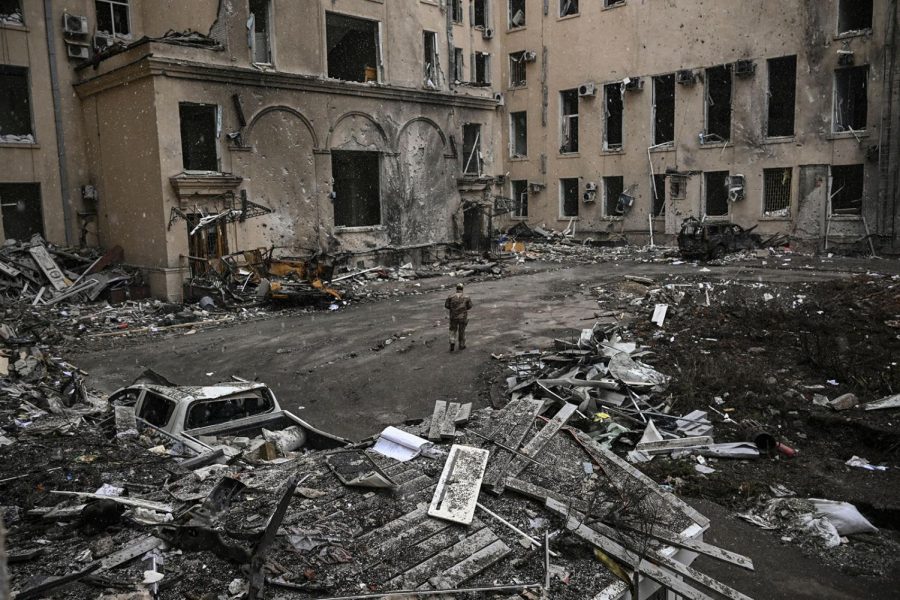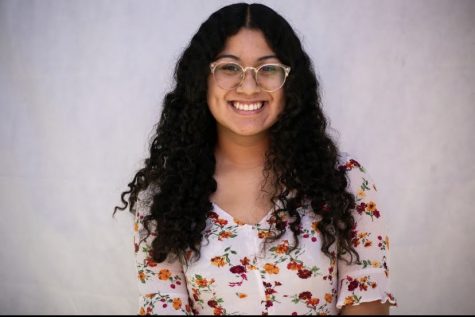*SUPPORT LINKS AVAILABLE AT THE BOTTOM OF THE PAGE
Russia’s invasion of Ukraine has affected many in the San Diego Mesa College community.
On the morning of Feb. 24, Mesa College student Andy Larkin awoke to the sounds of explosions in his hometown of Kyiv. These would document the first attacks by the Russian military on the independent nation of Ukraine. For many Mesa students, Ukraine is home to family and friends who are directly influenced by the recent violence.
As Mesa students and staff boldly share their stories and those of close family and friends, one sentiment is clear: despite the violence, the people and culture of Ukraine are resilient and will not be shaken. Despite the physical distance, it is vital that individuals in the U.S. support those in Ukraine and provide aid in any way possible.
Andy Larkin, whose name has been changed for anonymity, described waking up the morning of the first attacks as “one of those fever dreams you would wake up to and think you were still dreaming.” Larkin’s story is one that many Ukrainians can relate to, waking up to the attacks that continue in Ukraine today.
Ivana Polic, who is from Croatia and a mentor in the Mesa PATH fellowship program, expressed concern for several individuals who she knows personally. “The first thing that went through my mind was disbelief and fear for the people in Ukraine,” she said. She also spoke about how several of her friends who were living in Ukraine at the beginning of the invasion were able to leave their homes and escape the violence, however, there are still other friends and acquaintances who are sheltered in various locations in the country. Dr. Inna Kanevsky, psychology professor at San Diego Mesa College, explained how it was growing up in Ukraine. She expressed her deep connection to Ukraine and its culture, viewing it as home.
As these individuals spoke about the country which lies so dear to themselves, their families, and friends, an overwhelming description of the determination and spirit of those in Ukraine became evident. Ukrainian culture is so distinct and bold that the spirit of Ukraine has become far more evident through this time. “Even if it happens that the Russians advance and finally occupy Ukraine, I think that it is going to come at a huge cost for both the Russian society and the military because Ukraine is going to keep existing, whether or not it is physically there in the borders,” Polic said.
Several people in the Mesa community, who have been directly affected by the conflict, explained that support from the U.S. is incredibly important, not only through sending aid directly to Ukraine, but also in supporting friends and family members who are in your own communities. Over the past weeks, numerous different organizations have offered immediate assistance to the resistance in Ukraine from artillery support to refugee relocation. For those in a position to aid financially, several organizations are doing incredible work in Ukraine and the surrounding countries right now. However, even for those who may not be in a position to assist financially, many other forms of aid and advocacy exist. House of Ukraine, located in Balboa Park, is currently accepting donations for clothing, sanitary products, and supplies for infants. On a larger level, government sanctions are expected to be a notable influence in this war.
Since the beginning of the invasion, Russia has become the most sanctioned country, even surpassing Iran and North Korea, according to Bloomberg. Many believe that by speaking out about the issue, posting about it on social media platforms, and letting government leaders know that this is an issue important to Americans, our government and leaders will be more likely to take action to offer aid to Ukraine.
When it comes to Mesa and its support, many Ukrainian staff and students do not believe the college has taken enough action to support and aid those affected. “As a college, there has been nothing that I have heard of that Mesa has been offering, there hasn’t been any acknowledgment…there has not been specific support,” said Dr. Kanevsky. While the college did host a listening circle, “Mesa Cares” by Student Health Services, it was a singular event that occurred on March 7. Chancellor Carlos Cortez, who oversees all three of the colleges in the San Diego District, released a statement addressed to his “colleagues” in which he offered support and directed them to health services for each of the individual colleges, but there has been no other public statements or action taken by Mesa College.
“For now, it is not your problem, but in the future, if this is not stopped right now, it will become your problem,” Larkin said. He explained that while the conflict may seem distant to many Americans, the outcome of this war will be incredibly impactful not only politically, but economically to global politics and trade. With such intertwined global trade, the U.S. and many other countries have already begun feeling the impacts of the sanctions on Russia and most likely will continue to recognize the impact of the conflict. However, many believe that the consequences of these sanctions are not only necessary but will benefit the country from further sacrifices if the Russian government continues to gain power.
As more and more countries look to aid Ukraine, this conflict has begun to form a united front against the Russian government. Polic shared her pride in her own home country of Croatia and their efforts in providing aid. Having grown up in Croatia in the 1990s, Polic witnessed Croatia’s own independence and compared it to the current conflict. “As much destruction as we can see, I think what keeps me hopeful is all these people that are stepping in and offering their homes, their food, their shelter, their hearts, because we as a nation (Croatia) have this collective experience- that war is something that can happen very quickly and people know how to be united in those conditions,” she said.
While members of the Mesa community are concerned for loved ones still in Ukraine or actively fleeing violence, one continual concern surrounds the role that media and other forms of communication play within the war. Some people are hesitant to contact loved ones or ask them for too many details surrounding their location, as conversations surrounding wiretapping have become more and more popular.
Russian propaganda and misinformation in Russian media has also been at the forefront of conversations surrounding the role and safety of Russian citizens. For many, the reason for the war is still unclear and Russian media is heavily controlled by the government. “It turns out that my aunt believes that it’s the Ukrainians that are doing the bombing…there are people that believe that,” said Dr. Kanevsky.
In recent weeks, Russians have lost access to several different social media platforms where they could access media updates and resources from outside of the country. Larkin talked about how, near the beginning of the conflict, a popular messaging platform was flooded with misinformation and dramatic headlines and that there was “a lot of polar news.” Polic also shared a story of one of her friends who lives in Moscow. “She has been to anti-war protests in Moscow. She saw people being detained and she just feels very disheartened and is thinking about leaving the country, which is also becoming increasingly difficult.”
The policing of free speech and the consequences of speaking out against the war or the Russian government make clear the lack of power Russians have in their own country. With more recent rhetoric from Putin drawing even more concern for individuals who are in Russia that speak out against the government or the war efforts. With analogies from Putin himself who talked about chewing up “scum and traitors” and spitting them out like gnats, along with an increased effort to attack “false information.” In his recent speech, Putin also said that he believed “self-purification” would make the country a stronger and more unified place. Dr. Kanevskey explained that “he doesn’t see himself as an inheritor of the Soviet State, that was supposedly built in communism, but more like the Russian Empire… which included, for example, big chunks of what’s now Poland and Finland and other places.” She said that it is clear to her that Putin intends to restore this Russian Empire. Putin’s recent rhetoric has begun increasing these conversations about the safety of Russians within their own country.
As the conflict in Ukraine continues to increase, ultimately it is the voices of bold individuals like Polic which will resound, “The Ukrainian people and the Ukrainian spirit are going to prevail. They’re already the victors in this war.”
Support Links:
Larkin created an NFT of a peace flag raised over the Motherland Monument in Kyiv, all proceeds will go to Ukraine in the form of cryptocurrency, click here if you would like to buy an NFT.
Dr. Kanevsky created a page with resources and support links that is constantly being updated. Click here to open it.
The House of Ukraine
House of Ukraine is a cultural museum in San Diego, Balboa Park, providing information to the public about the country of Ukraine. Their purpose is to promote and cultivate the art, history, customs, language, and traditions of Ukraine. They also sponsor educational presentations, demonstrations, and events devoted to Ukrainian culture.
https://houseofukraine.org/donations/
UNICEF is on the ground before, during, and after emergencies, working to reach children and families with aid and long-term assistance. It is working with partners to reach vulnerable children and families with essential services – including health, education, protection, water and sanitation – as well as life-saving supplies.
https://www.unicefusa.org/war-ukraine
The Ukrainian Red Cross helps those in need affected by armed conflict through blood collection, mobilization of volunteers and resources, and emergency activities.
https://donate.redcrossredcrescent.org/ua/donate/~my-donation?_cv=1
Voices of Children, founded in 2015, gives psychological and psychosocial support to children who suffered as a result of war operations. They are currently helping children across the country and assisting in the evacuation process.
Vostok-SOS is a non-governmental organization that assists in finding housing for displaced individuals, evacuation from areas of direct conflict, and distributing humanitarian and physiological aid to those impacted by the war.
https://vostok-sos.org/en/ukraine-under-fire-support-vostok-sos-aid-operation/



